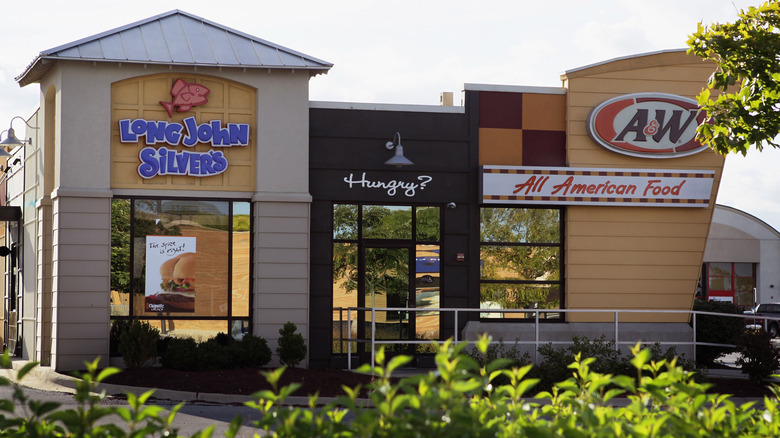Why Long John Silver's Big Catch Meal Was Tossed Back Into The Sea
Long before fast food chains offered fish sandwiches of varying quality, there was Long John Silver's. While there are still locations in 33 states, the chain has made many business blunders over the years that have shrunk its footprint. Its biggest controversy arose when its biggest meal deal showcased how the menu was unhealthy.
The Big Catch Meal debuted in May 2013. The centerpiece of the Big Catch was a plank of fried haddock (a fish commonly used in fast food) that was three times the size of other filets offered by Long John Silver's at the time. The hearty haddock was so big, the chain had to create special packaging to contain the fish during this limited time offer.
The Big Catch quickly caught the attention of industry watchdog Center for Science in the Public Interest (CSPI), a non-profit organization advocating for healthier food. In July 2013, the CSPI announced that the Big Catch was "the worst restaurant meal in America," calling out the high amount of partially hydrogenated oil in the meal. Factoring in the fish's breading, onion rings, and hushpuppies, the Big Catch contained a whopping 33 grams of trans fat — 16 times more than the American Heart Association considered a healthy daily intake. CSPI threatened to sue Long John Silver's if it continued to market the Big Catch with what the organization charged was deceptive nutritional information. By that August, Long John Silver's announced they would not only discontinue the Big Catch but would also switch to frying oil without trans fat. The restaurant began using 100% soybean oil in January 2014.
Long John Silver's has endured several marketing shipwrecks
The Big Catch's botched rollout wasn't the first time Long John Silver's landed in hot water for how it promoted its food. In 2005, the restaurant introduced Lobster Bites, a dish it proclaimed was made with "real lobster." One asterisk here: the seafood on sale was langostino, aka squat lobster. The name langostino translates to "little lobster" in Spanish, but a langostino is actually closer in origin to another crustacean, the hermit crab, than a traditional lobster. The Federal Trade Commission stepped in at the urging of lobstermen and Maine's then-Senator Olympia Snowe. In 2009, the FTC ruled that Long John Silver's needed to clarify in its ads that Lobster Bites were made with "langostino lobster."
Even the design of Long John Silver's restaurants proved controversial. Long John Silver's was under Yum! Brands ownership from 2002 to 2011, which led to Long John Silver's sharing space with A&W at locations in the style of those doomed Taco Bell-Pizza Hut hybrids. The co-mingling of fried fish with A&W's classic carhop diner format proved so unpopular among franchisees that one group, Treasure Isles Inc., sued Yum! Brands in 2010. The franchise group, which declared bankruptcy earlier that year, alleged fraud, stating that the hybrid formats were not constructed in a way to be profitable and weren't given sufficient Yum! promotional support.

